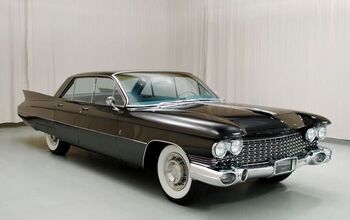General Motors Death Watch 111: Munit Haec Et Altera Vincit
Since the General Motors Death Watch began, GM employees, dealers and customers have emailed me their perspective on the General’s general degradation. Obviously, financial analysts are important (and confidential) contributors to this mix. While their info provides invaluable insight on the automaker’s slide into bankruptcy, their language can be daunting. So when I read this simple declarative statement in a recent investor briefing, I was shocked. “GM and Ford retail sales should continue their precipitous decline."
The numbers are bad. The Wall Street firm reckons GM’s February sales are set to drop 11%. That would leave the world’s largest automaker with a relatively paltry 23% share of the domestic market. Small, and unsustainable. According to The Detroit News, GM is currently losing $1300 on every vehicle it sells in the North American market. Toyota is making $2100.
The numbers suck, but the word is worse. “Precipitous;" as in “over a precipice.” As in free fall. Indeed, despite an endless stream of new product hype, the question is finally beginning to be asked: when and where will GM’s domestic misery end?
Although Rick Wagoner is the head of one of the world’s largest publicly held companies, GM's CEO has been stonewalling on this question since June 2005, when he announced the first round of production cutbacks and employee pay-offs buy outs. Unlike Carlos Ghosn, who set hard targets for Nissan’s turnaround, Wagoner has refused to commit to a defined– and thus measurable– corrective course. In other words, he’s completely unaccountable.
The American people aren't bothered. In fact, they're clueless. While amateur and professional pundits busy themselves debating GM’s fate, the average GM buyer doesn’t know/care about their transportation provider’s financial woes. They remain oblivious to the seismic rumbles foreshadowing the yawning chasm that’s about to open up and swallow GM’s business. At least that’s how things stood until last week.
Last week, the automotive press went slightly crazy. The possibility that GM would buy Chrysler unleashed a torrent of speculation about The Big 1.5. Aside from the frightening fact that Rabid Rick’s ego could be stroked with sufficient skill to get him to even contemplate such a preposterous move, and the millions in consultants’ and bankers’ fees paid to the strokers, the “GM wants Chrysler” media feeding frenzy was nothing more than a feeble distraction from a looming catastrophe.
The real action was going down at Daytona. During the Daytona 500 pre-race show, Toyota’s entry into NASCAR was a hot topic. Commentator Darrell Waltrip, who runs a Toyota truck in the Craftsman series, whose brother Michael operates a team that races Camrys in the Bush and Nextel series, was ready with a reply.
"Don't forget: the Camry is the only car of the four [Camry, Fusion, Monte Carlo and Charger] that's built in America. The Monte Carlo and Dodge are built in Canada and the Ford is built in Mexico. There are seven thousand people in Georgetown, Kentucky who build over three hundred thousand Camrys a year."
It was a defining moment in GM’s history. At a single stroke, the carmaker’s ability to wrap itself in the American flag was dealt a telling blow– in front of the very people to whom it matters most. By a man they respect and admire. This is our truck, this is our country. Uh-huh. Now tell me again what the Hell you boys are doing building Montes in Canada? Never underestimate the damage a company suffers when it breaks faith with its customers’ deeply held beliefs.
GM’s very own perception gap– the difference between the idea that they’re the home team and the company’s willingness to outsource automotive production abroad– is headed for extinction. It’s only a matter of time before GM is just another car company, just another once proud old line American business that couldn’t compete with faster, sharper and more intelligent competition.
The loss of patriotic identification is simply the continuation of a longstanding trend: GM’s diminishing stature. Fire Sale for All. Toe Tag Sale. Anyone with a pulse financing. Cash back. Imported Monte Carlos. At some point soon, the “average” GM customer’s understanding of GM’s place within the automotive firmament will evolve, from mighty power to beleaguered underdog to loser.
No wonder GM chose to pretend (perhaps even to itself) that’s it’s in a position to “buy” Chrysler (straight stock swap more like). Lest we forget, General Motors was formed by swallowing up smaller car companies. But this, well, this is a sad echo of a once great dynastic power’s ability to mow down all before it. The “Chrysler deal” is one last chance for GM’s power players to pretend that they’re calling the shots in the U.S. automotive market, rather than fighting a losing rearguard action against the barbarians inside the gates.
More by Robert Farago
Latest Car Reviews
Read moreLatest Product Reviews
Read moreRecent Comments
- THX1136 It's good knowing a purchase decision was well made. Glad to hear it's been a good car for you, Corey! May the good times continue to roll.
- Kwik_Shift_Pro4X I like bright red, like Ford's "Race Red" with black accents/trim on hot hatches. A distant second would be a lighter school bus yellow, like on a 90s Land Rover Discovery Camel Trophy edition.
- KOKing The color has to look right on the car first and foremost, but given the choice, I'll pick the not-bland color every time.
- Redapple2 Like the color but would never buy. Gladiator? Love them. (but some say they drive super wonky?)
- Redapple2 Note to layman. Lifts change the resting angles of suspension components. Then add full length of travel in the duty cycle and now you are repeatedly doing things to the suspension was never design for. Failures are very common and fatal. Do it only if you are stupid.


































Comments
Join the conversation
[...] Thanks to the actions of 50 state legislatures, no dealer can die. The General has too many dealers yet it cannot euthanize them. GM has spent the past two decades closing factories, laying off line workers, and buying out knowledge workers. Yet, its dealer network remains the same size when its share of the American market stood at 35%. Unfortunately for GM, its market share is sliding to less than 25% by the end of this decade. [...]
According to Mr Farago, GM is "fighting a losing rearguard action against the barbarians inside the gates". Actually, the barbarians are headquartered outside the gates, protected at home by $420 BILLION in low interest loans over the last five years from the Japanese government aimed at keeping the value of the Yen down. http://www.senate.gov/~levin/newsroom/release.cfm?id=251708 "Faster, sharper and more intelligent"? How about opportunistic, xenophobic and miserly, for words that more accurately describe Toyota. Perhaps you have never tried to solicit engineering contracts from their US offices. You should. Then tell me how you feel when they respond "we don't do that sort of work, we rely on our first tier suppliers for that..." Sure .... a top-flight company all the way through.